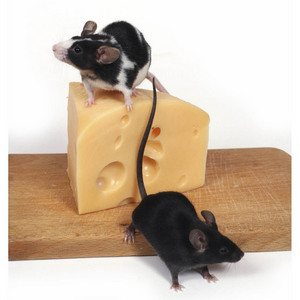Jul. 10, 2009 Research Highlight Biology
One gene shy of confidence
A timid knockout mouse separates conflicting emotional behavior for the first time
 Figure 1: Mice lacking active X11L genes show abnormal behavior to food in the presence of other mice.
Figure 1: Mice lacking active X11L genes show abnormal behavior to food in the presence of other mice.
A RIKEN-led group has developed a novel mouse strain that opens a door to future research into emotion.
Animal behavior is typically the outcome of conflicting emotions. The novel mouse shows abnormal approach, but not avoidance, behavior. So researchers can use it to dissect how emotions make us decide to approach or avoid, which may provide a key to understanding shyness.
Group leader Shigeyoshi Itohara and colleagues at the RIKEN Brain Science Institute in Wako and at Hokkaido University genetically engineered a mouse strain in which the X11L gene was purposefully deleted or ‘knocked out’. The researchers recently published a detailed analysis of the mutant mice in The Journal of Neuroscience 1.
X11L is a protein known to modulate neural activity in the brain. It also suppresses synthesis of the fibrous protein amyloid β, thought to cause Alzheimer’s disease. The X11L knockout (X11L-KO) mouse was originally developed in the hope of producing a model for Alzheimer’s disease, but it exhibited normal memory functions and learning capabilities.
The researchers did notice something unusual, however. The X11L-KO mice were subordinate to normal mice under conditions when the two needed to compete for food (Fig. 1). Mutant mice always lost weight compared to normal mice, yet displayed no loss of appetite or physical weakness.
The researchers then ran a series of experiments to identify the origin of this subordinate behavior. When placed in situations used to examine anxiety—in open fields or on elevated mazes, for instance—the X11L-KO mice responded normally. Itohara and colleagues found that resident X11L-KO mice were less likely to approach intruders, and demonstrated a decreased tendency to dig and burrow, and to bury marbles. These tests indicated the subordinate behavior of X11L-KO mice was due to a deficit in motivated approach behavior, not heightened anxiety or depressive characteristics—both of which are thought to be associated with avoidance behavior.
Chemically, X11L-KO mice displayed an imbalance of monoamine nerve modulation compounds in the forebrain. The abnormal responses could be reversed by the addition of active X11L genes to X11L-KO mice during development.
“These findings suggest that X11L is involved in the development of the neural circuits that contribute to conflict resolution,” says Itohara. “This mouse will provide us with opportunities to understand the mechanisms underlying approach behavior, and how to moderate it. With sufficient knowledge, we may be able to selectively modulate behavior, and possibly help overcome shyness in people.”
References
- 1. Sano, Y., Ornthanalai, V.G., Yamada, K., Homma, C., Suzuki, H., Suzuki, T., Murphy, N.P. & Itohara, S. X11-like protein deficiency is associated with impaired conflict resolution in mice. The Journal of Neuroscience 29, 5884–5896 (2009). doi: 10.1523/JNEUROSCI.5756-08.2009
